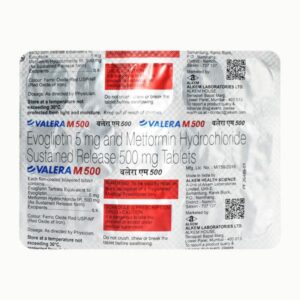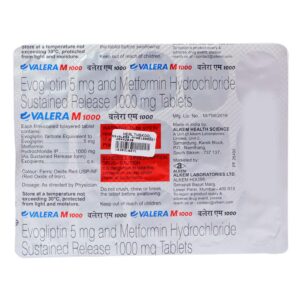METFORMIN + EVOGLIPTIN TARTRATE
Metformin: Metformin is a commonly prescribed medication used to manage type 2 diabetes. It belongs to a class of drugs called biguanides. Metformin works by reducing glucose production in the liver and increasing the body’s response to insulin.
The primary use of Metformin is to control blood sugar levels in people with type 2 diabetes. It is often prescribed alongside lifestyle modifications like diet and exercise. Metformin can also be used in the treatment of polycystic ovary syndrome (PCOS), a hormonal disorder that affects women of reproductive age.
The initial dose of Metformin is typically 500 mg to 850 mg taken once or twice daily, with meals. The dose can be gradually increased up to a maximum of 2,000 mg per day, depending on the individual’s response and tolerance.
Like any medication, Metformin may cause side effects. The most common side effects include gastrointestinal issues such as nausea, diarrhea, upset stomach, and abdominal discomfort. These side effects are usually temporary and can be minimized by taking the medication with food. In rare cases, Metformin can cause a serious condition called lactic acidosis, which requires immediate medical attention.
It is important to note that Metformin is not suitable for everyone. Individuals with certain medical conditions such as kidney or liver disease, heart failure, or a history of lactic acidosis may not be able to safely take the medication. It is important to consult a healthcare professional for personalized advice before initiating Metformin therapy.
Evogliptin Tartrate: Evogliptin Tartrate is a medication used to treat type 2 diabetes mellitus. It belongs to a class of drugs called dipeptidyl peptidase-4 (DPP-4) inhibitors. Evogliptin helps to control blood sugar levels by increasing the levels of incretin hormones in the body. Incretin hormones are responsible for stimulating insulin release and decreasing glucagon secretion.
The drug is taken orally in the form of tablets. The usual recommended starting dose of Evogliptin Tartrate is 5 mg once daily. However, the dosage may vary depending on the individual’s response and the guidance of a healthcare professional. It can be taken with or without food.
Like any medication, Evogliptin Tartrate may cause certain side effects. Common side effects may include headache, upper respiratory tract infection, nasopharyngitis (inflammation of the nose and throat), urinary tract infection, or hypoglycemia (low blood sugar levels). These side effects are generally mild and may resolve on their own. However, if they persist or worsen, it is important to inform a healthcare provider.
Other, less common side effects of Evogliptin Tartrate include allergic reactions, pancreatitis (inflammation of the pancreas), joint pain, and skin reactions such as rash or itching. If any of these severe side effects occur, immediate medical attention should be sought.
It is important to note that Evogliptin Tartrate should not be used to treat type 1 diabetes or diabetic ketoacidosis. It is also not recommended for use in patients with severe kidney or liver problems. It is essential to consult with a healthcare professional before starting or adjusting the dosage of this medication to ensure its safe and effective use.


